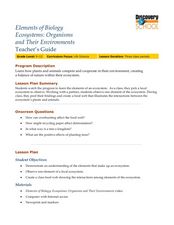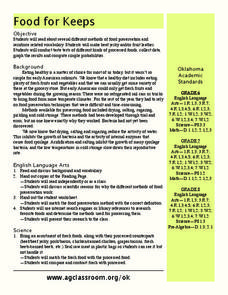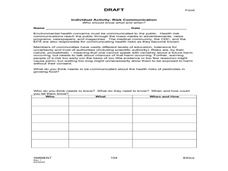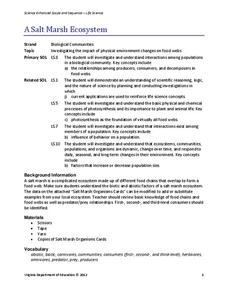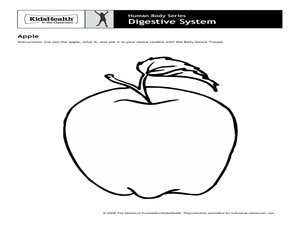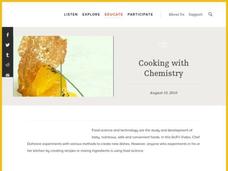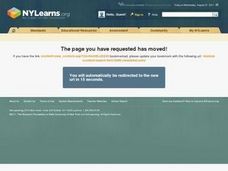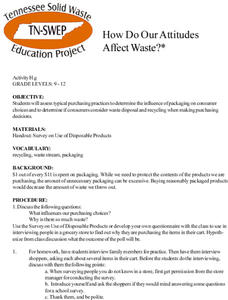Curated OER
Something Fishy - Bioaccumulation of Mercury
Students explore the dangers of eating high levels of mercury and how small amounts of mercury in water accumulate in greater quantities in organisms higher in the food chain. They list the health of effects of high levels of mercury on...
Curated OER
Organisms and Their Environments
Students study a local ecosystem and research the organisms to create a food web. In this ecosystem lesson plan, students view a video and answer questions. They visit a local ecosystem and make a list of organisms to research. Students...
Curated OER
The Quicker the Better? Food Processing
Sixth graders evaluate the nutrition of various foods. In this healthy eating lesson plan, 6th graders discuss the processing of many common foods and what this means. Students identify and research unfamiliar ingredients in processed...
Curated OER
Food For Keeps
Students explore food. In this processed and fresh foods lesson plan, students discover how some foods are processed and how they differ from fresh food. The complete group activities and an individual reading assignment. This lesson...
Curated OER
How is Your Food Grown
Students consider how their food is grown due to pesticide use. They reflect on the harm done to the various groups, then discuss the ethical questions from the perspectives of different stakeholders. IN addition, they compile relevant...
Virginia Department of Education
A Salt Marsh Ecosystem
What a web we weave. Pupils use yarn as the primary resource to create a web depicting the intricacies of a salt marsh ecosystem. They participate in a question and answer session, which leads to an in-depth facilitated discussion about...
Baylor College
Energy for Life (Energy from Food)
Energy comes in many forms, but how do living things get the energy they need to survive and thrive? In a simple, controlled experiment with yeast, water, and sugar, groups make observations about how yeast reacts with water alone, then...
Curated OER
From Milk to Cheese & Seed to Shelf
Learn about food production by making cheese, seeing how a seed gets to a shelf, and discussing food safety. Budding agriculturalists complete several activities and learn about food production, biotechnology, food preservation,...
Curated OER
Human Body Series - Digestive System
With articles entitled, "What's Puke?" and "What is a Fart?" this digestive system lesson plan is sure to be a gas! Elementary anatomists do a belly dance to illustrate how food moves through the digestive system and then design a board...
Baylor College
Why Circulate?
Lub-dub, lub-dub. Why does the heart beat? Why does blood circulate throughout the body? Life scientists find out how important circulation is for dissolving and dispersing materials by timing how long it takes for food coloring spread...
National Park Service
Living & Non-Living Interactions
What better way to learn about ecosystems than by getting outside and observing them first hand? Accompanying a field trip to a local park or outdoor space, this series of collaborative activities engages children in learning about the...
Science Matters
Crawly Composters
Get your hands dirty with an interactive lesson that showcases the process of decomposing and returning nutrients back into the soil. After building a compost pile, pupils regularly observe the ways worms help with changes to the soil...
British Council
Plastic-Free Is Not Easy
Paper or plastic? Scholars discuss a worksheet containing grocery photos in which consumers were challenged to buy items without plastic wrapping or containers. Learners rank the food items by the need for packaging, such as a banana,...
Baylor College
Do Plants Need Light?
Turn your classroom into a greenhouse with a lesson on plant growth. First, investigate the different parts of seeds, identifying the seed coat, cotyledon, and embryo. Then plant the seeds and watch them grow! Measure the new plants...
Science Friday
Cooking with Chemistry
Use class time to perfect your hollandaise sauce with a chemistry lesson. It includes two activities to teach about immiscible liquids, emulsifiers, and creating a stable homogenous mixture. Young scientists first mix liquids in a...
Curated OER
The Circulatory System--Part III
Young scholars research the process for the preparation of a soup. Students explore the safety issues of food preparation. Young scholars, after presenting their soups to the class, will eat their soups that they have prepared.
Curated OER
Mini-Ponds
In this mini pond worksheet, students create a mini-pond ecosystem with soil, water, and plant life. Students let their ecosystem sit for a day and they observe a sample the next day. Students identify all the pond water microorganisms...
Curated OER
From Milk to Cheese and Seed to Shelf
Students learn about food production by making cheese, seeing how a seed gets to a shelf, and discussing food safety. In this food production lesson plan, students complete 3 days worth of activities and learn about food production,...
Desert Museum
Daisy Ecology
Here's a fine lesson that combines poetry with life sciences. Learners carefully listen to a poem that's all about a food chain. As the poem is read, learners name the producer, the herbivore, the carnivore, and the omnivore. Lots of...
Curated OER
Nutrition -- A Lesson for Life - Biology Teaching Thesis
Students briefly explain the importance of nutrition in their everyday lives, and they tell you about how many calories they should consume in a day. They list readily available and affordable healthy foods that they LIKE to eat....
Kenan Fellows
How Much Energy Is That Anyway?
The fifth lesson in the six part series introduces units of energy including calories, Calories, and joules. Scholars determine the energy released when eating a snack and during activity.
Curated OER
How Do Our Attitudes Affect Waste?
Students conduct a survey of society's typical purchasing practices to determine the influence of packaging on consumer choices and to determine if consumers consider waste disposal and recycling when making purchasing decisions.
Curated OER
Circle of Life
Here is a well-designed science lesson that shows learners that everything that organisms do in ecosystems, including running, breathing, burrowing, growing, requires energy. After a thorough discussion of their own eating and drinking...
Curated OER
Skulls Tell It All
Skulls tell it all, and with this lesson plan, you will tell it all to your class! Youngsters view animal skulls, analyzing the shape of teeth and the placement of the eye sockets. They associate these adaptations with the types of food...



